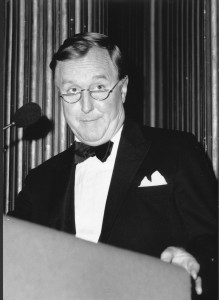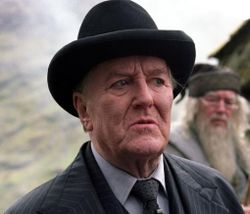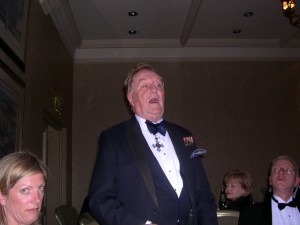Robert Hardy at 85: The Greatest “Churchill”

Written for a birthday tribute in October 2010….
We have all heard about the art of Timothy Robert Hardy, even though we don’t need to do so, since it is self-evident. But that really doesn’t matter, does it? His three-decade involvement with the Churchill saga provides a balsamic reiteration of what we know, are glad that we know, pity those who do not know, and are proud to be associated with.
It began with his peerless portrayals of Sir Winston in the 1981 “Wilderness Years” TV documentary; David Susskind’s 1986 “Leaders” series; a London stage play; the mini-series “War and Remembrance”; and—just this August 20th—a brilliant reading from Churchill’s tribute to “The Few” on its 70th annniversary. (Click here for the video.)
We can only begin to imagine the prodigious effort Tim made to master the role of Winston Churchill—to find, as he put it, “a way in.” Yet playing Churchill, he said, was “one of the best things that has ever happened to me.” Speaking to us in 1986, he likened the job to scaling Everest: “I shall never look down from the peak, but as long as I live I shall delight in gazing upwards toward those towering rocks.” The Churchill Society thought enough of his mountaineering to offer him the Blenheim Award, its highest accolade. But his acceptance honored us much more.
Robert Hardy has the distinction of having been on both sides in the Churchill story—for in 1974 he played von Ribbentrop toRichard Burton’s Churchill in “The Gathering Storm.” He told me he yearned to direct the great Anthony Hopkins as Churchill, but I said this must never occur until he is too old. And he still isn’t!
Long before he played Winston Churchill, this devoted student of Shakespeare played many of the Bard’s heroes and villains—roles he savored. He once remarked to an interviewer: “I have to keep saying to myself, ‘To play Hamlet at your age is out of the question. Stop it!’”
Others know him best for his superb role as Siegfried Farnon in “All Creatures Great and Small.” My wife once said to him, “You’ll always be Siegfried to me.” Tim quickly replied, “You’ll always be Barbara to me.”

Nowadays, we know him as Minister of Magic Cornelius Fudge in the Harry Potter films. He admitted to Barbara that his only regret in that role is that he was not equipped with his personal owl.
His knowledge of archery and his scholarly book, Longbow, led to his becoming archery consultant to the Mary Rose Trust: studying the longbows and arrows found in the famous ship, now being restored in Portsmouth. Through his intervention, one of our Churchill tour parties was given a private tour of the ship by its curator, who explained the lengthy process of drying ancient timbers.
The unfailing quality of Robert Hardy’s work is equaled by the unfailing courtesy of his manner. Those who meet him for the first time are struck by his gentility, as of course by his wit and erudition. There is something about him that is a dramatic betrayal of the persona one expects from a public reputation.

He has said that Winston Churchill was the one man last century who could lead us through the worst of times by the force of his mesmerizing speeches, monumental courage and personal charisma. I say in reply that Robert Hardy’s work expresses all the Churchillian qualities. Through his skill, the true Churchill emerged for out of the blue distance of time, for new generations to contemplate. That is something for which Churchill admirers are deeply grateful and honored—as I am to be part of this tribute to Timothy Robert Hardy, Commander of the Most Excellent Order of the British Empire.






